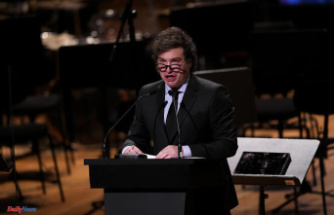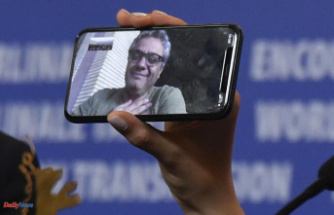The legal drama that fascinates Ivorians resumed on Thursday March 21 at the economic and financial penal center in Abidjan. Nineteen people and four companies implicated in vast international cocaine trafficking have been tried there since December. Among them, Tammam Machlab, a Lebanese businessman, manager of the Saphir Hotel, in the Cocody Angré district, prosecuted for criminal conspiracy and international cocaine trafficking.
With a broad silhouette and deep voice, the defendant speaks French with difficulty but relaxed. His jokes and borrowings from nouchi, Ivorian slang, make the audience laugh several times – and sometimes even the court. Especially since the accused struggles to justify his relationships with several traffickers.
The prosecutor questions him about conversations discovered during the investigation in his telephone, in particular his exchanges with a certain "Mohamed", an English-speaking client "from Ghana or Nigeria", according to Mr. Machlab, who says he met him in the Saphir nightclub. Here is his story: when the man, drunk, could no longer stand, the manager came to his aid and offered him a coffee, but Mohamed balked and asked for cocaine. Mr. Machlab refuses. After the incident, Mohamed leaves the hotel but, grateful, wants to keep in touch with his savior.
A few months later, the Covid-19 pandemic forced Mr. Machlab to close his hotel. He then receives a call from Mohamed, who comes to the news. “We chatted and he started talking honey with me [flattering me], reports the defendant, making some spectators giggle. He tells me that he is creating a cocaine network in Ivory Coast and that, as he likes me and likes my area, he would like me to participate as a dealer.
“If I block a mobster, he’ll get angry! »
“Shocked” by the proposal, Mr. Machlab decides not to refuse it head-on, for fear of reprisals. He therefore pretends to negotiate cocaine prices, evokes the fanciful demands of imaginary clients and ends up getting rid of the unwelcome trafficker. The president of the court, surprised by this strategy, asked him why not simply blocked him on his phone. “But if I block a mafioso, he will get angry!” exclaims the defendant. He knows people here! »
The prosecutor then mentions another interlocutor, registered under the name “R. R. Ramon”. A Ghanaian gold seller who allegedly defrauded him by selling him a copper alloy at the price of pure gold, according to Mr. Machlab. The scheme was revealed and seeing the hotel manager furious, R. R. Ramon allegedly offered him, to make amends, to take part in various trafficking activities, notably counterfeit notes and cocaine. A proposal that Mr. Machlab would also have declined. “Why are two men who don’t know each other offering to take part in drug trafficking? », asks the president.
“There is a third person!”, intervenes the prosecutor. Do you know someone named Ishmael? » He is a Moroccan friend who simply sold him automobile spare parts, Mercedes models, because his “car was spoiled [broken]”, replies Mr. Machlab. The president takes out several sheets of the instruction file. These are photographs of these pieces, taken from the conversation between Ismaël and the defendant, she explains. She calls Miguel Angel Devesa Mera, the central defendant in the trial and alleged mastermind of the trafficking, to the stand.
With the same composure and affability as in previous hearings, the former Spanish police officer puts on his glasses and observes the documents for a few seconds. The atmosphere in the courtroom suddenly regains its seriousness. “These are packets of cut cocaine that I packaged myself here in Ivory Coast,” he announces calmly. The Mercedes logo? Its trademark, to help identify the owner of the goods at a glance. Put in difficulty by this testimony, Mr. Machlab challenges the court: “But what drug seller would leave all these photos in his phone? » The president responds with a shrug: “There is no perfect crime…”
“In this business, no one uses their real name.”
Mr. Devesa Mera drives the point home: “When I received my new shipment of cocaine here, in January 2022, my contacts told me that the manager of the Saphir Hotel could help me sell it. He asked for 100 grams to test the goods. He was pleased with the quality and ordered a few kilos from me. But when my men left to deliver it to the Saphir, they had the impression that police officers were among the hotel guests. They got scared and left the hotel with the cocaine. »
Did he see Mr. Machlab with his own eyes? “You know, I had received three tons. If I start taking care of small clients myself, imagine how much time it would take me..." Mr. Devesa Mera did not hear the name of Mr. Machlab, nor those of "Mohamed", "Ismaël" or " R.R. Ramon.” But he specifies that “in this environment no one uses their real name”; perhaps he knows them under other aliases.
In a final attempt to exonerate him, Mr. Machlab’s lawyer repeats to Mr. Devesa Mera the question asked by his client: “Would a trafficker leave such compromising images on his phone? » Such negligence would certainly be “unprofessional”, assures the Spaniard, but “in Ivory Coast people use their phones too irresponsibly”. “This trial will mark a before and after,” he concludes. I can assure you that all drug traffickers take careful note of everything that is said here. »
The trial will resume on Thursday March 28 with the hearing of the last accused, Lassana Soumano, whom Mr. Devesa Mera accuses of having ensured his connection with the manager of the Saphir Hotel.












